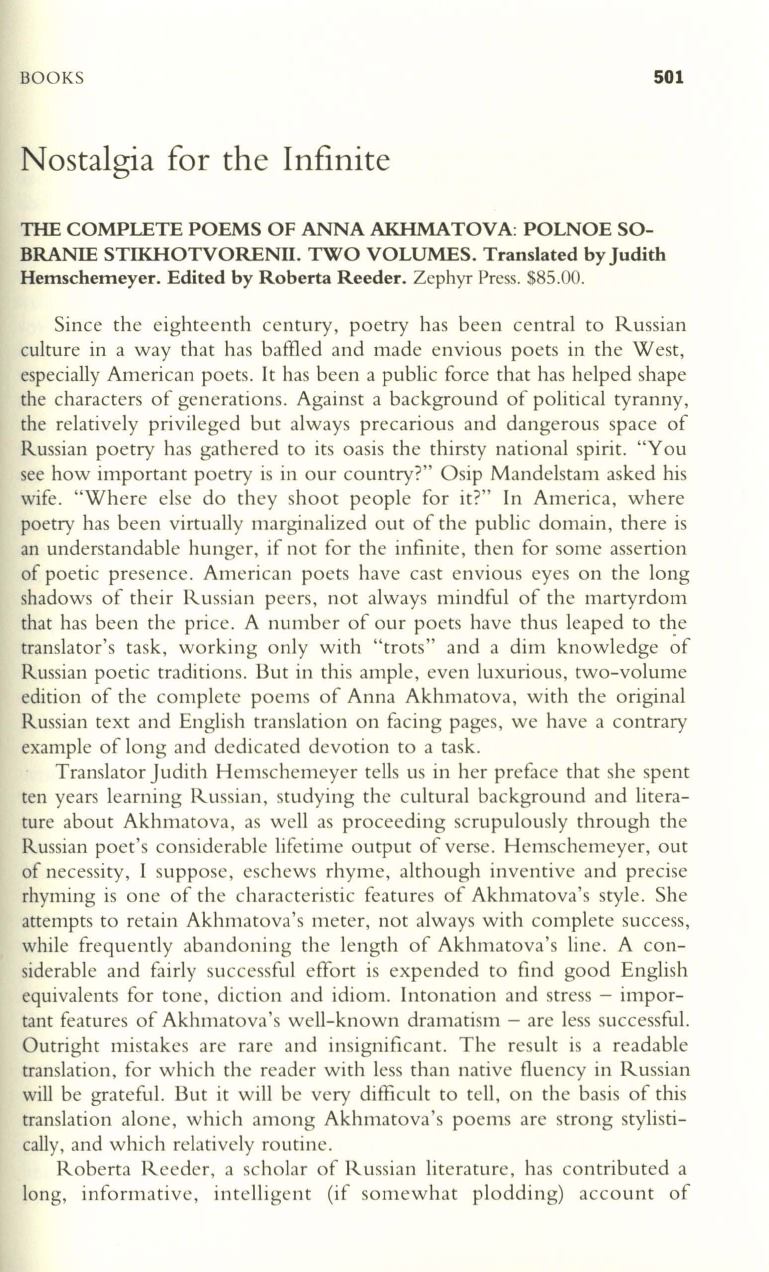
BOOKS
501
Nostalgia fo r the Infinite
THE COMPLETE POEMS OF ANNA AKHMATOVA: POLNOE SO–
BRANIE STIKHOTVORENII. TWO VOLUMES. Translated by Judith
Hemschemeyer. Edited by Roberta Reeder. Zephyr Press. $85.00.
Since the eighteenth century, poetry has been central to Russian
culture in a way that has bailled and made envious poets in the West,
especially American poets. It has been a public force that has helped shape
the characters of generations. Against a background of political tyranny,
the relatively privileged but always precarious and dangerous space of
Russian poetry has gathered to its oasis the thirsty national spirit. "You
see how important poetry is in our country?" Osip Mandelstam asked his
wife. "Where else do they shoot people for it?" In America, where
poetry has been virtually marginalized out of the public domain, there is
an understandable hunger, if not for the infinite, then for some assertion
of poetic presence. American poets have cast envious eyes on the long
shadows of their Russian peers, not always mindful of the martyrdom
that has been the price. A number of our poets have thus leaped to the
translator's task, working only with "trots" and a dim knowledge ;f
Russian poetic traditions. But in this ample, even luxurious, two- volume
edition of the complete poems of Anna Akhmatova, with the original
Russian text and English translation on facing pages, we have a contrary
example of long and dedicated devotion to a task.
Translator Judith Hemschemeyer tells us in her preface that she spent
ten years learning Russian, studying the cultural background and litera–
ture about Akhmatova, as well as proceeding scrupulously through the
Russian poet's considerable lifetime output of verse. Hemschemeyer, out
of necessity, I suppose, eschews rhyme, although inventive and precise
rhyming is one of the characteristic features of Akhmatova's style. She
attempts to retain Akhmatova's meter, not always with complete success,
while frequently abandoning the length of Akhmatova's line. A con–
siderable and fairly successful effort is expended to find good English
equivalents for tone, diction and idiom. Intonation and stress - impor–
tant features of Akhmatova's well-known dramatism - are less successful.
Outright mistakes are rare and insignificant. The result is a readable
translation, for which the reader with less than native fluency in Russian
will be grateful. But it will be very difficult to tell, on the basis of this
translation alone, which among Akhmatova's poems are strong stylisti–
cally, and which relatively routine.
Roberta Reeder, a scholar of Russian literature, has contributed a
long, informative, intelligent (if somewhat plodding) account of


